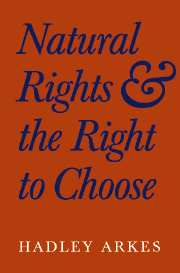Book contents
- Frontmatter
- Contents
- Acknowledgments and Dedication
- ONE Introduction: Backing into Treason
- TWO The Drift from Natural Rights
- THREE On the Things the Founders Knew – and How Our Judges Came to Forget Them
- FOUR Abortion and the “Modest First Step”
- FIVE Antijural Jurisprudence
- SIX Prudent Warnings and Imprudent Reactions: “Judicial Usurpation” and the Unraveling of Rights
- SEVEN Finding Home Ground: The Axioms of the Constitution
- EIGHT Spring Becomes Fall Becomes Spring: A Memoir
- Postscript, January 2004
- Index
FIVE - Antijural Jurisprudence
Published online by Cambridge University Press: 05 June 2012
- Frontmatter
- Contents
- Acknowledgments and Dedication
- ONE Introduction: Backing into Treason
- TWO The Drift from Natural Rights
- THREE On the Things the Founders Knew – and How Our Judges Came to Forget Them
- FOUR Abortion and the “Modest First Step”
- FIVE Antijural Jurisprudence
- SIX Prudent Warnings and Imprudent Reactions: “Judicial Usurpation” and the Unraveling of Rights
- SEVEN Finding Home Ground: The Axioms of the Constitution
- EIGHT Spring Becomes Fall Becomes Spring: A Memoir
- Postscript, January 2004
- Index
Summary
Henry James said of one of his characters that he was the victim of perplexities from which a single spark of direct perception might have spared him. If we were to credit their own words, we would have to suppose that a cluster of federal judges, men and women who had been schooled at the priciest academies in the land, really could not fathom what was meant by a “partial-birth” abortion. For in one decision after another, beginning in the summer of 1997, and picking up momentum, in a building series of decisions by the spring ofl998, the judges were confronting bills on partial-birth abortion in the States, and striking down everyone of them on the claim that the statutes were afflicted with a fatal “vagueness.” In the legends of the law a “vague statute” might be something on the order of an ordinance that barred any “fooling around in the park.” It would be vague in the sense that it was tellingly imprecise about the conduct it meant to forbid, and so even the ordinary person, strolling in the park, might not have a fair warning of the kind of conduct that might be punishable. Under those conditions, a person of ordinary prudence might take care to steer a wider course away from the range of conduct that could run afoul of the law.
- Type
- Chapter
- Information
- Natural Rights and the Right to Choose , pp. 112 - 146Publisher: Cambridge University PressPrint publication year: 2002



